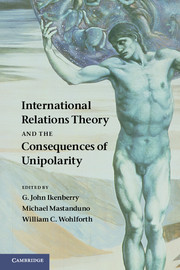Book contents
- Frontmatter
- Contents
- Figures
- Tables
- Notes on the contributors
- Notes on the editors
- 1 Introduction: unipolarity, state behavior, and systemic consequences
- 2 Unipolarity, status competition, and great power war
- 3 Legitimacy, hypocrisy, and the social structure of unipolarity: why being a unipole isn't all it's cracked up to be
- 4 Alliances in a unipolar world
- 5 System maker and privilege taker: US power and the international political economy
- 6 Free hand abroad, divide and rule at home
- 7 The liberal sources of American unipolarity
- 8 Unipolarity: a structural perspective
- 9 Unipolarity and nuclear weapons
- 10 From unipolarity to multipolarity: transition in sight?
- 11 Sell unipolarity? The future of an overvalued concept
- Index
- References
9 - Unipolarity and nuclear weapons
Published online by Cambridge University Press: 05 June 2012
- Frontmatter
- Contents
- Figures
- Tables
- Notes on the contributors
- Notes on the editors
- 1 Introduction: unipolarity, state behavior, and systemic consequences
- 2 Unipolarity, status competition, and great power war
- 3 Legitimacy, hypocrisy, and the social structure of unipolarity: why being a unipole isn't all it's cracked up to be
- 4 Alliances in a unipolar world
- 5 System maker and privilege taker: US power and the international political economy
- 6 Free hand abroad, divide and rule at home
- 7 The liberal sources of American unipolarity
- 8 Unipolarity: a structural perspective
- 9 Unipolarity and nuclear weapons
- 10 From unipolarity to multipolarity: transition in sight?
- 11 Sell unipolarity? The future of an overvalued concept
- Index
- References
Summary
The nuclear–unipolarity puzzle
What are the implications of nuclear weapons for unipolarity? Both unipolarity and nuclear weapons have been subject to extensive analysis. Virtually every treatment of contemporary unipolarity makes reference to nuclear weapons, but virtually no analysis of nuclear weapons considers unipolarity. Exploring the impact of nuclear weapons on unipolarity would seem straightforward enough, but in reality is very complicated because theorists disagree about so many important aspects of both nuclear weapons and unipolarity.
Theorizing about nuclear weapons has been a central part of international theory for more than six decades. While there are still some outliers, theorists of the effects of nuclear weapons on international politics have a near consensus on the central importance of nuclear deterrence. Dispute remains about what is necessary to achieve deterrence, and how prone it is to failure. But the proposition that nuclear weapons deter conflicts by vastly raising the cost of war is both theoretically robust and widely held. According to this view nuclear deterrence has made international politics much more peaceful than in pre-nuclear times. The topic of nuclear weapons and unipolarity therefore can be simplified into a consideration of the relationship between nuclear deterrence and unipolarity.
- Type
- Chapter
- Information
- Publisher: Cambridge University PressPrint publication year: 2011
References
- 6
- Cited by



